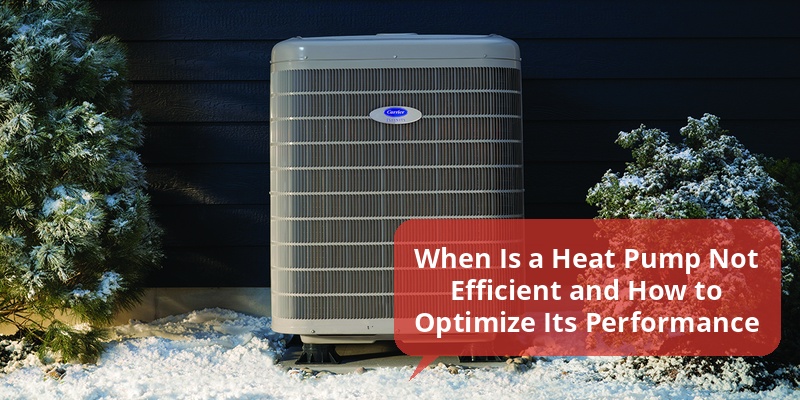Heat pumps are an energy-efficient solution for heating and cooling homes across the United States. However, their efficiency can drop under specific conditions, leading to higher energy consumption and costs. Understanding when a heat pump is not efficient helps homeowners maximize savings and comfort. This article dives deep into factors that reduce heat pump efficiency and offers practical tips to enhance its performance.
| Factor Affecting Efficiency | Impact on Heat Pump | Optimization Strategy |
|---|---|---|
| Extremely Low Outdoor Temperatures | Heat pumps struggle to extract heat effectively, increasing energy use | Install a cold-climate heat pump or auxiliary heating system |
| Poor Insulation and Air Leaks | Excessive heat loss or gain, forcing the system to work harder | Improve building insulation and seal leaks |
| Inadequate Maintenance | Decline in system performance and efficiency due to dirty components | Schedule regular maintenance and clean filters/coils |
| Improper Sizing | Oversized or undersized units lead to inefficiency and short cycling | Consult HVAC professionals for proper sizing during installation |
| Incorrect Thermostat Settings | Unnecessary operation and energy wastage | Use programmable thermostats with optimized settings |
How Outdoor Temperature Affects Heat Pump Efficiency
Heat pumps extract heat from outside air, even when it’s cold, but their efficiency decreases as outdoor temperatures drop below freezing. In extremely low temperatures (below 25°F), the heat pump must work harder or switch to supplemental electric resistance heating, which is less efficient and more costly to operate. This is a key reason why standard heat pumps may not be suitable for very cold climates without modifications.
Cold-climate heat pumps are designed to operate efficiently in subzero conditions by using advanced refrigerants and enhanced compressors. They maintain heat output and reduce the need for backup heating, making them the preferred choice for northern U.S. regions.
Impact of Building Insulation and Air Leaks
Heat pumps are more efficient when heating or cooling a well-insulated, airtight home. Poor insulation causes heat loss during winter and heat gain during summer. This forces the heat pump to run longer and consume more energy. Common problem areas include windows, doors, attics, and basements where gaps or cracks allow air infiltration.
Improving insulation in walls, ceilings, and floors along with sealing air leaks helps maintain stable indoor temperatures and lowers heat pump workload. This results in significant energy savings and extends the lifespan of the system.
The Role of Regular Maintenance in Heat Pump Efficiency
Neglecting regular maintenance is a frequent cause of reduced heat pump efficiency. Dust and debris accumulate on filters, coils, and fans, restricting airflow and heat transfer. A dirty system must work harder to meet temperature demands, increasing energy use and wear.
Annual professional inspections and seasonal cleaning keep components in top condition. Replacing or cleaning filters every 1-3 months and clearing outdoor unit debris maximizes system efficiency and reliability.
Consequences of Improper Heat Pump Sizing
Selecting the right size of heat pump for a home is critical. An oversized heat pump cycles on and off frequently (short cycling), which wastes energy and causes temperature fluctuations. An undersized unit runs continuously but fails to maintain comfort, leading to excessive wear and higher bills.
Proper sizing considers the home’s square footage, insulation, windows, and climate. HVAC professionals use Manual J load calculations to ensure the heat pump meets but does not exceed heating and cooling demands.
Thermostat Settings and Operational Efficiency
Incorrect thermostat settings lead to inefficient heat pump operation. Setting temperatures too drastically or constantly adjusting them causes the system to run more than necessary. This increases energy consumption without improving comfort.
Using a programmable or smart thermostat helps optimize heating and cooling schedules based on occupancy and preferences. Setting temperature setbacks during sleep or absence increases efficiency while maintaining a comfortable environment.
Additional Factors That May Affect Heat Pump Efficiency
- Defrost Cycle Frequency: In cold, humid climates, frost buildup on outdoor coils increases defrost cycles, reducing heating efficiency temporarily.
- System Age and Technology: Older heat pumps have lower Seasonal Energy Efficiency Ratios (SEER) compared to modern models, impacting energy costs.
- Installation Quality: Poor installation can lead to refrigerant leaks, improper airflow, and other issues that reduce system performance.
How to Improve Heat Pump Efficiency in Challenging Conditions
Homeowners can implement several strategies to ensure efficient heat pump operation even when conditions are less than ideal:
- Upgrade to a Cold-Climate Heat Pump: Ideal for regions with harsh winters, it maintains superior efficiency below freezing.
- Install Supplemental Heating: Using a backup furnace or electric heaters during extreme cold prevents overloading the heat pump.
- Enhance Home Insulation and Air Sealing: Reduces thermal losses and workload on the heat pump.
- Schedule Regular Maintenance: Keeps the system clean, well-lubricated, and operating smoothly.
- Use Smart Thermostats: Automate temperature control to avoid unnecessary heating or cooling.
- Consult Professionals for Optimal Sizing and Installation: Ensures correct system capacity and proper setup.
